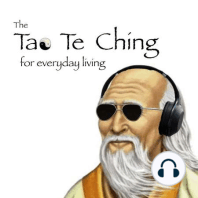23 min listen

Tao Te Ching Verse 14: NoThing and NowHere
Tao Te Ching Verse 14: NoThing and NowHere
ratings:
Length:
31 minutes
Released:
Dec 26, 2019
Format:
Podcast episode
Description
Tao Te Ching Verse 14Translated by Gia-Fu Feng & Jane EnglishLook, it cannot be seen - it is beyond form.Listen, it cannot be heard - it is beyond sound.Grasp, it cannot be held - it is intangible.These three are indefinable;Therefore they are joined in one.From above it is not bright;From below it is not dark:An unbroken thread beyond description.It returns to nothingness.The form of the formless,The image of the imageless,It is called indefinable and beyond imagination.Stand before it and there is no beginning.Follow it and there is no end.Stay with the ancient Tao,Move with the present.Knowing the ancient beginning is the essence of Tao.Photo by Martin Widenka on UnsplashHere begins what Lin Yutang calls Book III - the Imitation of Tao. Lao Tzu seems to be reminding us of the un-namable and mystic quality of the Tao in this verse. I feel like he’s saying, ‘before we begin, let’s remember the eternal nature of the Tao.’ How the Tao is like a shadowCan’t see it, can’t hear it, can’t touch it. And yet it’s the thing that’s responsible for the known Universe and beyond. A statement like this, even in 2020, will get you filed away as someone who’s lost it. Imagine what it would have been like for Lao Tzu! Trying to name something that eludes all senses seems, on the surface, like an exercise in futility, doesn’t it? But for us, we happy humans who have had a beautiful introduction to the Tao thus far, we can glimpse, if even for a fleeting moment, the invisibility, the inaudibility, and the intangibility of this all pervasive force. We looked at Verse 12, the one that talks about inner vision. It was obvious from that verse that fulfillment only of the corporeal and egoistic senses are unfulfilling. It’s only when we discover the Tao though our inner vision that we become awakened to this seeming no thing. And really, all we can do at our very best is talk about it, hint at it, say what it’s not, and in so doing only get a feel for the Tao’s negative. I like to compare this to the idea of a shadow of something. The shadow itself only indicates what is causing it. Try to capture a shadow, and you’ll come up empty every time. The shadow is a negative of what is actually creating it. So it’s kind of like a negative indicator. It reveals what’s not there.We can observe the shadow. But the shadow is actually the absence of light! How can we see the absence of light? We can’t hear a shadow, nor can we touch it. But it’s there. We can sense it, can’t we? And we even have a name for it, but when we pause to consider what it actually is, we can’t really pin it down. Similar to the Tao.
Released:
Dec 26, 2019
Format:
Podcast episode
Titles in the series (80)
Tao Te Ching Verse 7: Abandoning Identity by The Tao Te Ching for Everyday Living